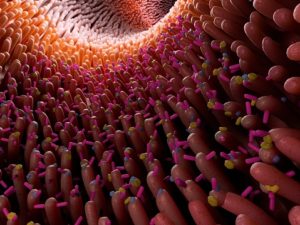As reported in Nature Microbiology, researchers have identified a set of enzymes isolated from human gut bacteria that convert the A antigen on red blood cells to the H antigen. Since the mucus lining of the intestines serves as a source of nutrition for bacteria comprising the human gut microbiome and this lining also contains A and B antigen structures, the researchers constructed a metagenomic library of ~19,500 fosmids from fecal matter provided by a group AB+ donor and performed several rounds of screenings, sequencing, and in-depth analysis of fosmids containing A-antigen-cleaving activity. The study identified a set of enzymes (a deacetylase and a galactosaminidase) from Flavonifractor plautii which efficiently converted group A antigens to H antigens, as found on O red blood cells, via a galactosamine intermediate. These enzymes work efficiently at a low concentration in whole blood and can be removed via standard blood processing protocols. Although more research is needed to ensure that all traces of the A antigen have been removed, the enzymatic conversion of group A blood to universal group O blood could be a key strategy to help alleviate blood shortages.
Reference:

